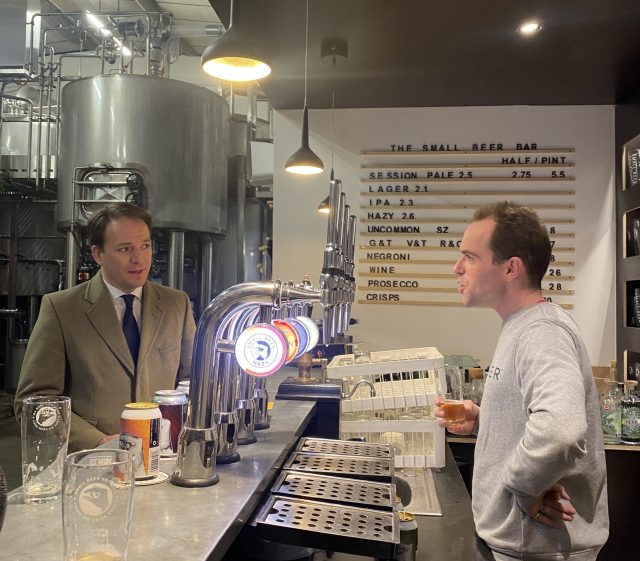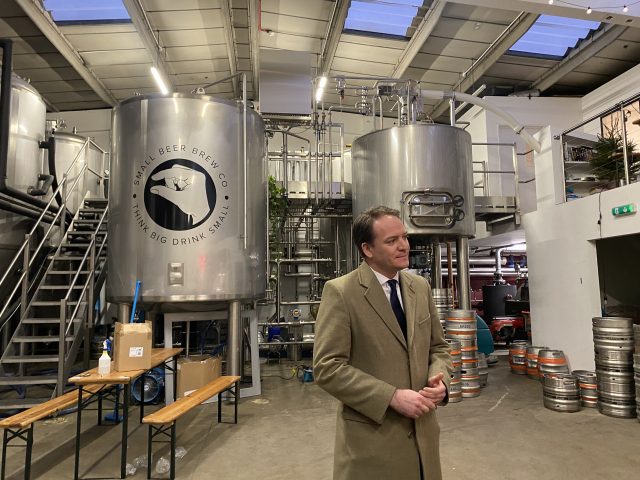This website uses cookies so that we can provide you with the best user experience possible. Cookie information is stored in your browser and performs functions such as recognising you when you return to our website and helping our team to understand which sections of the website you find most interesting and useful.
Treasury minister on duty: ‘there are going to be winners and losers’
Treasury minister Gareth Davies told the drinks business that the Chancellor’s announcement of a duty freeze last week is in part a “recognition that some have been impacted by the reforms that we introduced” in August.

Chancellor Jeremy Hunt’s duty freeze, announced in last week’s Autumn Statement, stops what would have been the second substantial tax rise for alcohol in only a matter of months, following the biggest change to duty in 50 years in August. That change saw a replacement to the former alcohol duty system.
The previous reform, which was first proposed by Rishi Sunak in 2021 during his time as Chancellor, was met with continuous backlash from industry bodies and professionals who claimed the new system treated wine and spirits unfairly.
Exchequer secretary to the Treasury Gareth Davies took a trip to Small Beer Brew Co in South Bermondsey following last week’s announcement, where he was hosted by the business’s co-founder Felix James and joined by Barry Watts, head of public affairs at the Society of Independent Brewers (SIBA).

Small Beer Brew Co produces low-strength beers with an ABV below 2.8%, and the business has benefitted from some of the changes implemented on 1 August, including the Small Producer Relief scheme. The new system is also modelled on a ‘stronger the alcohol, higher the duty’ concept, meaning a lower-alcohol producer like Small Beer also gets some relief as a result.
James told db that between July and August, the rate of duty paid by the business had been reduced by “a few hundred pounds”. However, he was keen to stress that this was a “drop in the ocean” when compared with the other cost pressures faced by the business.
He said the reduction in duty was “minute in comparison to inflation, changes in consumer spending and cost increases”. Looking to the future, he added that the few hundred pounds saved on taxes was “certainly not going to keep a business producing this volume afloat”.
Speaking directly to James, Treasury secretary Davies acknowledged that the Government “can’t step in with as much support as people would like”.
“We do appreciate how awful this year has been,” he said, noting that “we’re in a tricky spot as well” when it comes to inflationary pressures.

What about wine and spirits?
When asked about the impact of the 1 August duty reform on wine and spirits producers, Davies acknowledged that “there are going to be winners and there are going to be losers”, based on the new system of “the stronger the alcohol, the more duty you pay”.
“What I would simply say is that we have provided a lot of engagement throughout the entire process with the wine and spirits industry. We’ve designed it in a way which, as I say, is pretty clear to understand for the public, but also for businesses. And for the wine industry in particular, we’ve provided a wine easement. We’ve listened to their concerns about the change and whether and how that can impact their products,” he said.
“I completely accept that some duty has gone up and some has gone down within the wine and spirits industry, but it is not fair to say that it has all gone up for the wine industry.”
Davies explained that the Government “took a decision to reform alcohol duty based on the ability to do it”, as a result of the Brexit referendum. He argued that the EU duty system, which Britain was forced to adopt prior to Brexit, was “very complicated, disjointed, and it wasn’t consistent”.
“We’ve been able to simplify our duty system in accordance with public health priorities for the first time, and simplify it in the sense that the more alcohol, the more duty,” he said.
Wine and spirits businesses have struggled as a result of duty rises. The freeze on duty announced last week does not impact these hikes, but prevents a second duty hike in line with inflation which would raise the overall increase in wine duty to 30% since the summer.
Ahead of the Autumn Statement which took place on Wednesday 22 November, drinks associations, including the Wine and Spirit Trade Association (WSTA) and the Wine Society and the Scotch Whisky Association (SWA), came together with some of the UK’s largest alcohol producers, to argue that alcohol duty hikes had resulted in the Treasury receiving less tax revenue.
The associations pointed to recent sales figures since the August duty rise which revealed off-trade sales had showed a drop of around 20% in spirits in the last 28 days, and a double digit drop for wine in the same period.
When asked whether the duty freeze was an attempt by Government to mitigate the negative impact that reforms have had on the drinks industry, Davies told db that the freeze was put in place in part to give businesses “more time to adapt” to the changes.
He said: “What we’ve done is we’ve been able to freeze duty to provide more support to the industry at a time of very high inflation, but also in recognition that some have been impacted by the reforms that we introduced, and we want to give them more time to adapt to that.”
Will the duty freeze be extended?
When asked about a possible extension to the duty freeze, Davies said: “We keep all taxes under review.”
“We were really clear that we wanted to extend the freeze to August to provide consumers, but mainly producers, that certainty in terms of where duty is going.”
Barry Watts, head of public affairs at the Society of Independent Brewers (SIBA), challenged this sense of certainty, arguing that a six-month freeze was not long enough. SIBA, and other trade bodies besides, were hoping for a year-long freeze until 1 February 2025. Watts explained that fiscal changes are expected to occur every February, and shortening that gap gives British businesses less time to prepare.
However, Davies stressed that an extension to the duty freeze would still be under review. “We’ve had a lot of freezes over the years,” he said. “This time we’re able to freeze it because we have got inflation down, but we’re not out of the woods yet so we will see where we are in August.”

